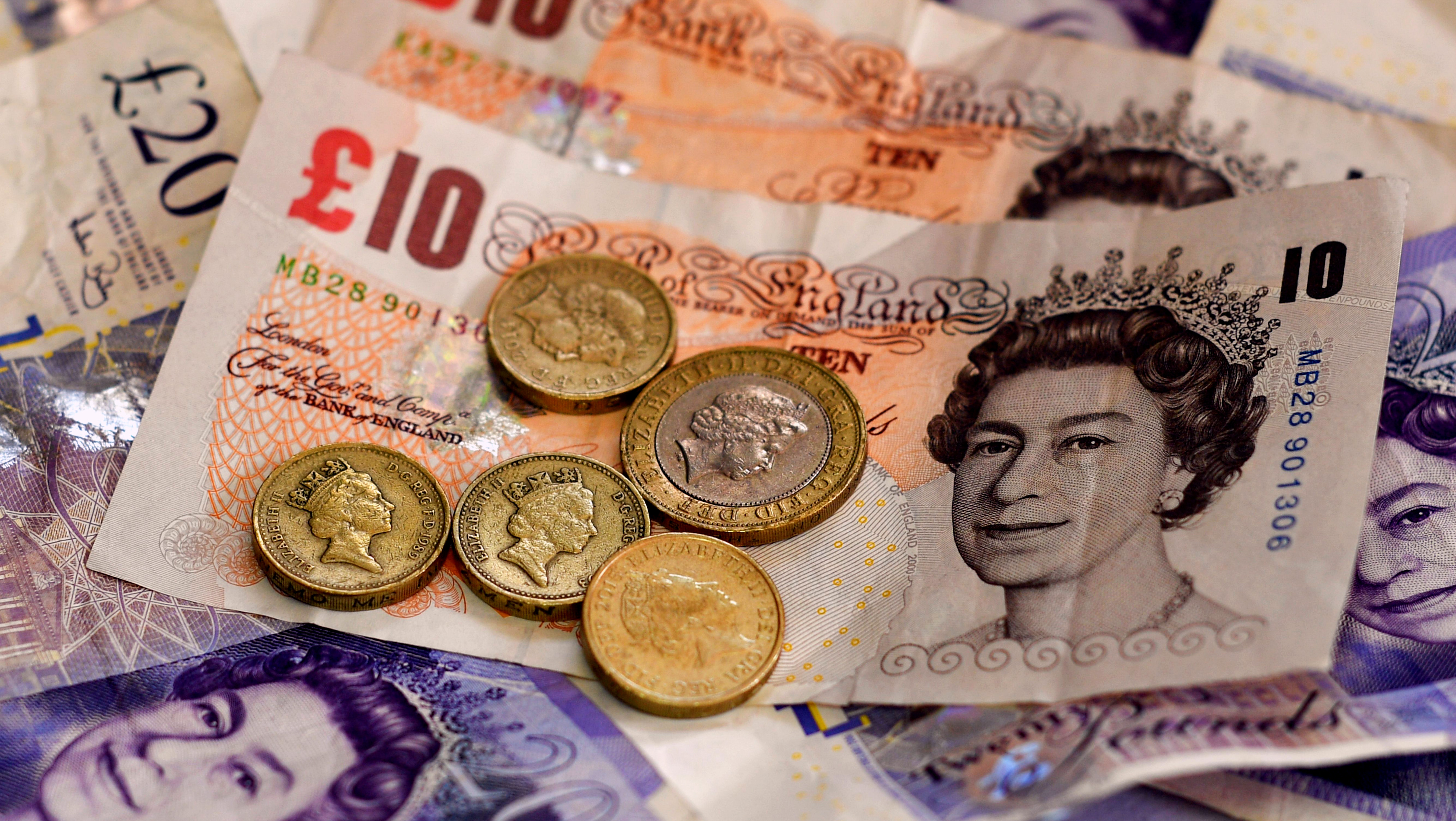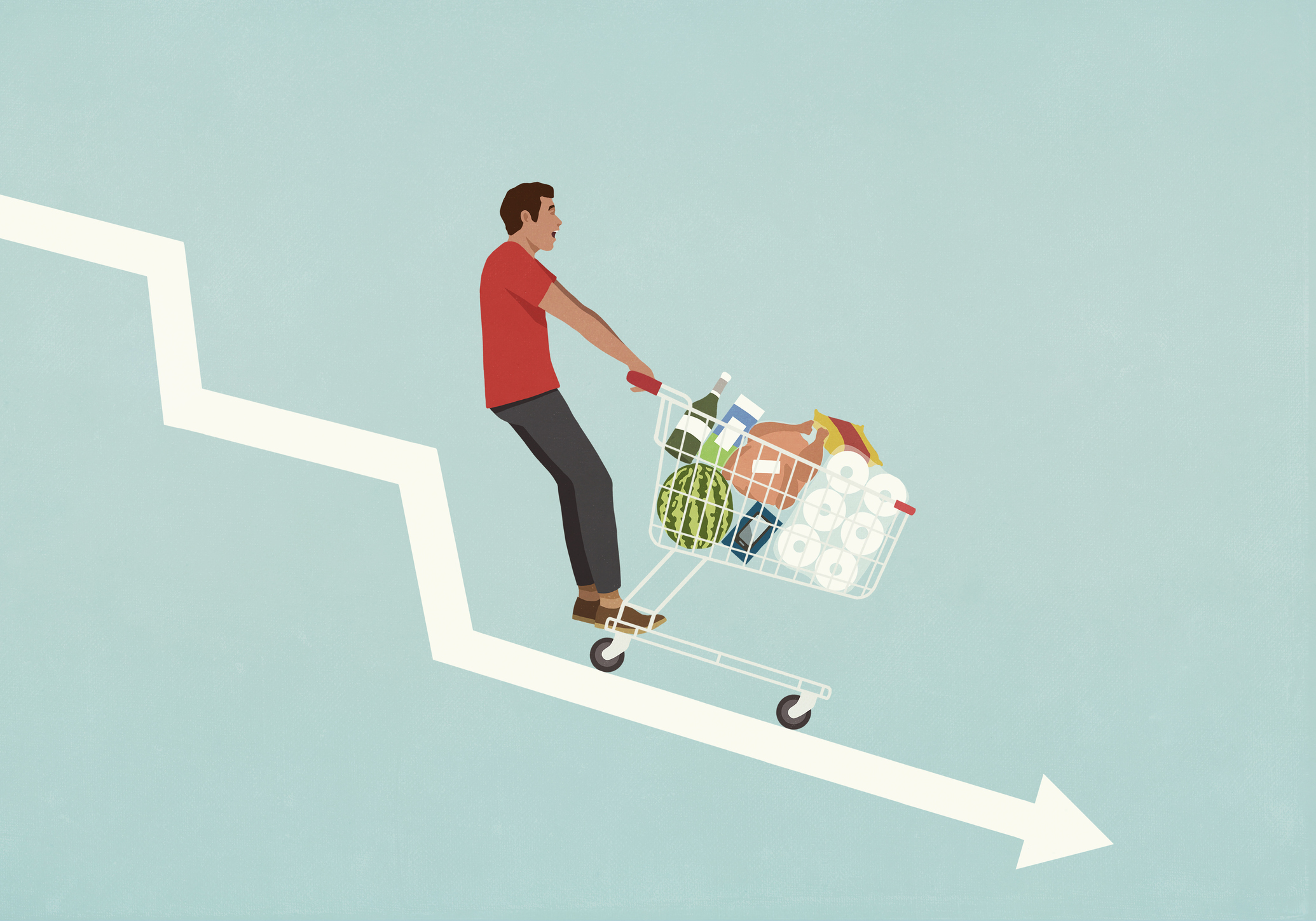Cost of living squeeze may be 'overblown'
Bills index compiled by Money Saving Expert suggests core costs are rising in line with wages

A free daily email with the biggest news stories of the day – and the best features from TheWeek.com
You are now subscribed
Your newsletter sign-up was successful
Food prices fall despite Marmite-gate
2 November
"Consumers will be relieved," analyst Richard Lim, of Retail Economics, told the Daily Telegraph, responding to figures showing UK food prices have remained "deflationary" despite the "anguish caused by the 'Marmite wars'".
According to the British Retail Consortium's (BRC) survey for October, food prices fell by an average of 1.2 per cent.
The Week
Escape your echo chamber. Get the facts behind the news, plus analysis from multiple perspectives.

Sign up for The Week's Free Newsletters
From our morning news briefing to a weekly Good News Newsletter, get the best of The Week delivered directly to your inbox.
From our morning news briefing to a weekly Good News Newsletter, get the best of The Week delivered directly to your inbox.
More generally, shop prices were down 1.7 per cent, marginally less than the 1.8 per cent fall in September.
Despite fears the slump in the pound would send prices surging, there is "no sign yet of any damage to consumers' wallets", says the Telegraph.
However, the fall in food prices was driven by a "very sharp" two per cent drop in the cost of fresh food such as vegetables and unprocessed meat.
This in turn reflects an ongoing "supermarket price battle", as the so-called "big four" – Asda, Tesco, Sainsbury's and Morrisons - focus on own-brand offers and compete aggressively with discounters Aldi and Lidl for market share.
A free daily email with the biggest news stories of the day – and the best features from TheWeek.com
Popular consumer brands, many of which are not stocked in Aldi and Lidl but are available across all of the other major grocers, are less inclined to keep up this margin pressure.
That's why Unilever reacted to the near-20 per cent fall in the value of the pound against the dollar since the vote for Brexit by seeking to hike the cost of products such as Marmite, Hellman's Real Mayonnaise and Dove soap by ten per cent.
Tesco, however, refused to comply and a public spat led to a "compromise" deal.
Nevertheless, others accepted the increases and the cost of Marmite has gone up 12.5 per cent at Morrisons.
Data from MySupermarket website shows Unilever is not alone: Heinz products ranging from baby food to tinned spaghetti have increased by an average of up to 59 per cent since the referendum.
Lim said that one reason retailers are able to keep lowering prices is because they "will have hedged against the post-referendum fall in sterling". These contracts will begin to "unwind" early next year, he warned, and prices could then rise rapidly.
Economists generally believe consumer inflation will rise to three per cent next year, although the National Institute of Economic and Social Research has predicted it could hit four per cent.
Marmite-gate returns: Morrisons raises price by 12.5%
31 October
Tesco's public spat with products giant Unilever may be over, but shoppers are still facing Brexit-related price rises.
Several press reports indicate Unilever has upped its wholesale prices of Marmite by ten per cent in response to the inflationary effect on import prices of the post-referendum slump in the pound and the Grocer says Morrisons, Britain's fourth-biggest supermarket brand by market share, has introduced a price rise on the "love it or hate it" spread that is higher than Tesco's.
The store has increased the price by 12.5 per cent and is charging £2.64 a jar, says the BBC. Shoppers at Sainsbury's can get it for £2.50, while it's £2.34 at Waitrose and Tesco and Asda has it on offer at £2.
However, some are questioning the need for the rises given that Marmite is produced and packaged in the UK. But Unilever says its own costs are rising as it has to import many of the elements used in the jar's packaging – and import costs are also going up.
Since the UK voted for Brexit, the pound has fallen by around a fifth against the dollar and 15 per cent against the euro.
After a 24-hour stand-off between Tesco and Unilever, during which the likes of Marmite, Hellman's Mayonnaise, Ben & Jerry's ice cream and Dove toiletries were removed from the grocer's website, a compromise agreement was reached.
The nature of the deal is unknown, but the Financial Times says industry experts believe any rises at Tesco are likely to be "much lower than Unilever's initial demands".
And of course, it doesn't mean prices won't go up – there is already evidence they are doing just that - although it does mean the blow has been lessened, handing Tesco a significant PR win.
A Morrisons spokesman conceded the chain "sometimes [has] to increase prices as a result of costs rising, although we do our best to avoid this", and said the supermarket had reduced 3,000 prices over the past year.
'Marmite-gate' is over – but are other prices going up?
14 October
A very public pricing spat that saw Tesco briefly suspend online sales of Marmite and other popular brands has been swiftly resolved.
Unilever, the makers of the love-it-or-hate-it spread, along with the likes of Ben & Jerry's ice cream and Hellman's mayonnaise, had tried to up its prices by around ten per cent, says Sky News.
The company blamed the slump in the pound, which is down almost a fifth against the dollar since the vote for Brexit, saying the drop had increased import prices. Tesco, however, refused to pay any more and removed Unilever's products from its online store.
Now a deal has been done and the grocer is restocking the brands.
"We'll never be told the details of the settlement, but one suspects Tesco had the better of the skirmish because Unilever, a company that can come across as holier-than-thou at times, was ill-prepared for a dirty public fight," says Nils Pratley in The Guardian.
Unilever has faced a barrage of criticism because most of the products in question are produced in the UK. It said it uses imported ingredients and packaging, but the "across-the-board price hike did indeed look too much, too soon", adds Pratley.
Dennis Dickinson, 70, from Burton, where Marmite is made, told the Guardian: "Everything about Marmite is local – the workers, the ingredients – so ultimately… it is just downright profiteering."
The Daily Telegraph's Allister Heath says Tesco was playing "a clever PR hand: it has turned itself into a neutral advocate of consumer interests – a campaigner for lower prices".
Whatever the specific nature of this dispute, most experts agree the slump in the pound will push prices up more generally. Some branded goods are already costing substantially more.
The Telegraph's Katie Morley reports that data from MySupermarket website shows Heinz baby food has increased by 59 per cent, going up from £2.39 to £3.81 since the referendum, while the company's tinned spaghetti is 21 per cent more expensive at £1.26 instead of £1.04.
The figures also show that a basket of popular Heinz, Kellogg's, Coca-Cola and Pepsi items has risen by more than 12 per cent since June, compared to a rise of one per cent in an average basket of supermarket goods.
Brexit hits Marmite lovers around the UK
13 October
Brexit has hit some of the UK's most loved brands, including Marmite, PG Tips and Pot Noodles.
Tesco has withdrawn these products and more from its online site following a row over pricing with Anglo-Dutch consumer goods company Unilever.
The supplier is "the UK's biggest food and grocery manufacturer with many famous brand names", says the BBC.
It's all the result of the UK's decision to leave the EU, which has sent the pound tumbling by more than 18 per cent against the dollar and 16 per cent against the euro.
Unilever says this has pushed up the cost of imported goods it uses and wants to increase wholesale prices as a result.
However, the UK's supermarkets are locked in a bitter price war that has prompted two years of consistent deflation. Tesco is already operating at low margins and fears a hit to its competitiveness if it passes on the increases to customers.
As a result, it has stopped selling Unilever's products to its online shoppers. The brands are still available at its supermarkets, said the grocer, but it is not restocking and "shelves were running short ".
"Negotiations over price between retailers and their suppliers are a constant feature of the industry, but those discussions rarely lead to a public argument and product de-listing," says the BBC.
Bruno Monteyne, an analyst at Bernstein, says: "Clearly the scale of the negotiation is much bigger than usual, but so is the event. Brexit-sized events are rare."
A source told The Guardian: "Unilever is using Brexit as an excuse to raise prices, even on products that are made in the UK."
Unilever rejects the charge, saying it has to import some of the elements, such as bottles and jars, for products made in the UK.
Finance director Graeme Pitkethly said the changes were part of a normal "devaluation-led cycle". The company also said price rises had "landed" with other retailers, meaning some of Tesco's key rivals may have accepted the increases.
The Bank of England previously warned shoppers increasing import costs and a desire by supermarkets not to raise prices could lead to a reduction in content size and quality, leaving consumers paying the same for less.
-
 Can Europe regain its digital sovereignty?
Can Europe regain its digital sovereignty?Today’s Big Question EU is trying to reduce reliance on US Big Tech and cloud computing in face of hostile Donald Trump, but lack of comparable alternatives remains a worry
-
 The Mandelson files: Labour Svengali’s parting gift to Starmer
The Mandelson files: Labour Svengali’s parting gift to StarmerThe Explainer Texts and emails about Mandelson’s appointment as US ambassador could fuel biggest political scandal ‘for a generation’
-
 Magazine printables - February 13, 2026
Magazine printables - February 13, 2026Puzzle and Quizzes Magazine printables - February 13, 2026
-
 How your household budget could look in 2026
How your household budget could look in 2026The Explainer The government is trying to balance the nation’s books but energy bills and the cost of food could impact your finances
-
 With economic uncertainty, 2025 looks to be a 'No Buy' year
With economic uncertainty, 2025 looks to be a 'No Buy' yearIn the spotlight Consumers are cutting back on splurges to combat overconsumption
-
 3 tips to lower your household bills
3 tips to lower your household billsThe Explainer Prices on everything from eggs to auto insurance to rent have increased — but there are ways to make your bills more manageable
-
 What's next for US interest rates?
What's next for US interest rates?The Explainer A pause after a series of cuts
-
 Where will inflation go next?
Where will inflation go next?The Explainer Believe it or not, inflation is easing up
-
 What is shrinkflation and why is it happening?
What is shrinkflation and why is it happening?The Explainer The practice reduces the size of a product without lowering the price — and it's perfectly legal
-
 Prices are going down. Here's where you can see the difference.
Prices are going down. Here's where you can see the difference.The Explainer 'An era of price hikes is fading,' but that doesn't mean prices will all come down
-
 5 tips when retiring amid market volatility
5 tips when retiring amid market volatilityfeature In a turbulent market, diversification becomes especially important